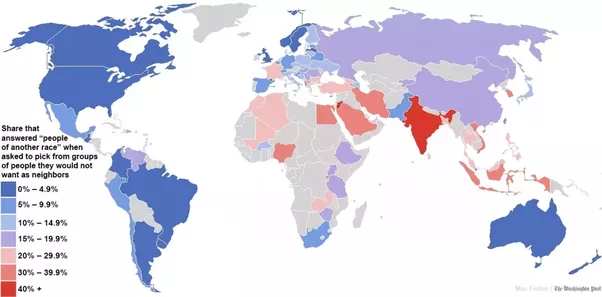Let’s talk about racism | India is open to foreigners if they are white

Like German efficiency and British wit, Indian hospitality has earned an international reputation. Foreigners return home from Indian holidays with tales of their hosts’ unmatched kindness. Everyone was so nice; they didn’t mind that their guests couldn’t speak a word of any Indian language; and they even made sure the food wasn’t too spicy.
Western bloggers positively swoon. “I was amazed by the smiles I’ve seen in India, which taught me a huge lesson on human interaction, family and community,” writes one. “The respect and desire to be of service was also remarkable and the greetings and farewells of, ‘Namaste,’ so sincere,” reports another.
I’ve lived in Delhi for about a year and a half, and my own experience has hardly been different. In everything, the standards set for me are comically low. Speak three consecutive words of Hindi, and people act like I’m a wizard; eat the same food as everyone else, and suddenly I’m a paragon of epicurean adventurousness. I needn’t ride with Justin Bieber in his tour Rolls Royce to feel the glow of celebrity; I can just stand in front of India Gate for a minute or two, and some eager stranger is sure to ask if he can take his picture with me.
Yep, for foreigners, India is pretty great. Well, for foreigners like me, anyway. That is to say, white foreigners.
Black foreigners coming home from India might tell different stories about Indian hospitality. Imran Uba, upon returning to Nigeria from his studies in Noida, will likely tell his family and friends about how an angry mob, convinced that African students had actually eaten an Indian classmate, beat him so badly he had to be hospitalized. Maxwell Orji, another Nigerian student, can regale his loved ones back home with stories of how Indians spat on him and called him racist names. “Indians have a bad impression of foreigners,” Orji told the Financial Times in April. “I get harassed all the time, [get] laughed at, called names.”
Masonga Kitanda Olivier, a Congolese foreign language teacher, won’t be able to share any stories of his time abroad — he died last year after three men, not content simply to abuse him with racial slurs, beat him with bricks and stones.
I’m not here to cast stones. My own country, after all, is as racist as they come. America’s ascendency would have been impossible had it not been for my ancestors’ genocide of Native Americans and enslavement of Africans. And racism in the United States is not a thing of the past. Life remains so bleak for Native Americans that their suicide rate among young adults is nearly twice the national average; African Americans continue to suffer under a system designed to keep them in prison and out of university. That’s to say nothing of my compatriots’ racist attitudes towards Latin Americans, Muslims, and, indeed, Indians.

*Europe, Latin America and the Caribbean, Northern America, Oceania, Unknown/Multiple Origins
In short, the last thing anyone needs is a sanctimonious lecture from a white American about racism. Nor do I want to give the impression that I’m ungrateful for the hospitality with which I’ve been received here. India has permitted me to travel freely within its borders, allowed me to work at one of its finest newspapers, and forgiven my cultural blunders. I have been welcomed unconditionally.
I just don’t quite understand why. When was the collective decision made to be so accommodating to us white people? A study of the long annals of white people’s exploration of foreign lands reveals a clear and resounding pattern: people who look like me are bad news. Not individually, perhaps — lots of us are perfectly harmless. But the history of white people abroad is one of exploitation, violence, and destruction. If the past provides any lesson at all, it’s that if you let enough of us in, we’re liable to steal your biggest diamond and redraw your borders. You welcome us at your peril.
Of course, the bad old days of rapacious colonialism are long past. Now, we simply foist our multinational corporations upon you, regardless of whether you would prefer your children to attend school rather than work in coal mines, or whether you object to being gassed to death.
But if I’m puzzled about Indians’ hospitality towards white foreigners, I’m absolutely stumped by the hostility towards black ones. Where India’s interactions with the West have often been marked by conflict, India and most African nations have enjoyed friendly relations throughout recent history. India and Africa both suffered under European colonialism, and both continue to struggle to shed themselves of that terrible legacy.
If I, a white man who has done so little to earn the privilege of your kindness, can return home and gush about Indian hospitality, then black foreigners ought to be given reason to do so, too.
Harry Stevens uses data and graphics to tell stories at the Hindustan Times. He was born in the US but has lived in India since 2015.
- Previous Will any good come out of the US-Arab coalition?
- Next Trump-Duterte phone call: Full transcript
















